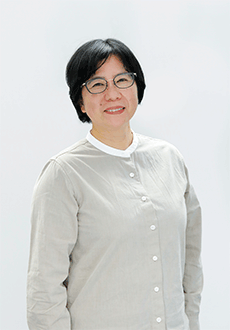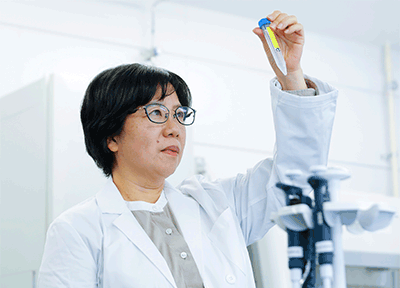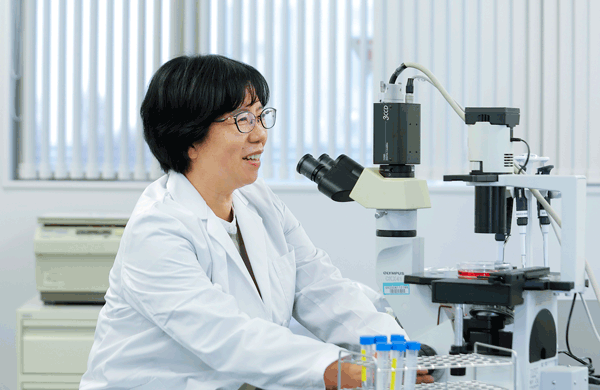My current work is basic research that supports the development of regenerative medicine, which gives me a sense of responsibility and fulfillment (Mami Takasaki, Research & Development Scientist)

Many women active in a variety of fields work at RIKEN BRC. We interviewed 12 of these women for their insights on how they continue to flourish with work styles that fit their particular lifestyles.
In this interview, we talked with Mami Takasaki, a Research & Development Scientist on the iPS Cell Advanced Characterization and Development Team.
She worked as a postdoc at the U.S. National Institutes of Health, and studied molecular developmental biology. Takasaki is currently the laboratory manager, and helps her team in areas other than research as well. She spoke to us about her thoughts on work, motivation, and hopes for the future, among other topics.
Profile
- Mami Takasaki
- Research & Development Scientist, iPS Cell Advanced Characterization and Development Team
- After earning her PhD degree at the University of Tsukuba, she worked as a postdoc at the U.S. National Institutes of Health. She returned to Japan in 2001 to take a position at RIKEN’s Kobe Campus. After attending the University of Tsukuba and the Ibaraki Prefectural University of Health Sciences, she returned to RIKEN in 2018. Currently, she is working on characterization analysis on disease-derived iPS cells and the development of new culture methods for iPS cells.
My current work is basic research that supports the development of regenerative medicine, which gives me a sense of responsibility and fulfillment.
When I was in high school, I was really interested in what I learned in class about genes, and that inspired me to go into biology. The research was even more interesting than I had imagined, and my curiosity to learn even more pushed me to get a master’s and a PhD. After finishing graduate school, I wanted to work with researchers overseas, so I decided to study abroad in the United States. I worked at the National Institutes of Health, and studied molecular developmental biology using African clawed frog (Xenopus laevis) embryos as material.
After returning to Japan, I shifted my research to the field of stem cell biology and regenerative medicine, and was appointed to my current team in 2018. I am working on characterization of disease-specific iPS cells deposited from laboratories across Japan and establishment of new iPS cell lines.
Since RIKEN BRC is the organization responsible for the maintenance and distribution of bioresources, its primary mission is to ensure that researchers throughout Japan and around the world can handle the resources with confidence. Up until now, I have just focused on the research I’ve wanted to do, but in this position, my specific assignment comes with responsibilities. I am always aware of the seriousness of the responsibilities I’ve been entrusted with.
Also, when the cells we have analyzed are used in various studies and this leads to new discoveries, it gives me a sense of accomplishment that I have not had in my previous role, and this is what motivates me in this job.
I work hard to create an environment in which all of the team members can focus on their research.

Currently, I am also the lab manager for my team. My main role is to provide an environment in which work proceeds smoothly, which means that I not only replenish and manage the reagents and equipment needed for research, but also occasionally address members’ concerns and problems.
For this reason, I am always trying to create an atmosphere that makes it easy for people to come talk to me. Simply talking sometimes satisfies people and clears their mind. When you work with someone, you often get a sense if something is off, so I try to approach my coworkers myself and resolve issues at an early stage.
Our team consists of 13 members, including students, and over half are women. I think it is easier in some ways for women to talk to people of the same gender, and I think this lowers some of the resistance they may feel about coming to me with their problems and makes it easier for me to draw out their thoughts.
We also have some researchers on our team who come from overseas and are not able to speak Japanese well, so another advantage is that I can advise them in English. I’m so pleased that I can use the skills I learned studying abroad in ways I hadn’t expected. I will continue to really focus on creating an environment conducive to work performance and try to be helpful in areas other than research as well.
Now that the more intense days of child-raising are over, I want to really enjoy both my research and hobbies.
I think that research is a really fun career. There are difficult times, like when you have to repeat an experiment over and over and the research does not go the way you thought it would, but I never get over how amazing the moment is when you make a new discovery.
There are many more female graduate students and researchers than when I was a graduate student, but even so, there are still fewer women in this industry. I think that women may become anxious when thinking about marriage and having children. However, they can continue to thrive in their career if they are smart about using the programs available, and in fact, there are many people who have done so at RIKEN BRC. I think understanding of female researchers will deepen going forward, so I hope that anyone interested does not hesitate to take up this challenge.
I hope to push forward with my research, and now that my children are grown, I also want to take some time for myself as well. Until now, I had no hobbies, but I figured I should find a hobby so I started going to cooking classes to learn how to make bread and sweets. It has turned out to be a really good change of pace because it gives me the chance to talk to people from completely different backgrounds. I plan to enjoy my work and also focus more on my personal life as well.
